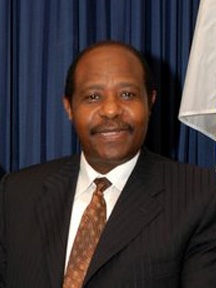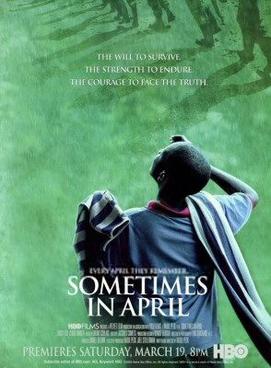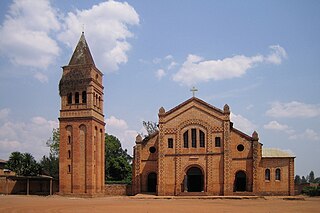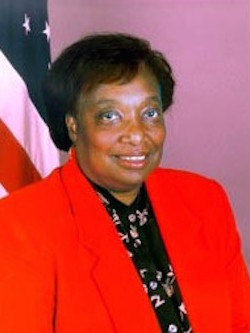
The Interahamwe is a Hutu paramilitary organization active in the Democratic Republic of the Congo and Uganda. The Interahamwe was formed around 1990 as the youth wing of the National Republican Movement for Democracy and Development, the then-ruling party of Rwanda, and enjoyed the backing of the Hutu Power government. The Interahamwe, led by Robert Kajuga, were the main perpetrators of the Rwandan genocide, during which an estimated 500,000 to 1,000,000 Tutsi, Twa, and moderate Hutus were killed from April to July 1994, and the term "Interahamwe" was widened to mean any civilian militias or bands killing Tutsi.

The Rwandan genocide, also known as the genocide against the Tutsi, occurred from 7 April to 19 July 1994 during the Rwandan Civil War. Over a span of around 100 days, members of the Tutsi ethnic group, as well as some moderate Hutu and Twa, were systematically killed by Hutu militias. While the Rwandan Constitution states that over 1 million people were killed, most scholarly estimates suggest between 500,000 and 662,000 Tutsi died. The genocide was marked by extreme violence, with victims often murdered by neighbors, and widespread sexual violence, with between 250,000 and 500,000 women raped.
Agathe Uwilingiyimana, sometimes known as Madame Agathe, was a Rwandan political figure. She served as Prime Minister of Rwanda from 18 July 1993 until her assassination on 7 April 1994, during the opening stages of the Rwandan genocide. She was also Rwanda's acting head of state in the hours leading up to her death.

The failure of the international community to effectively respond to the Rwandan genocide of 1994 has been the subject of significant criticism. During a period of around 100 days, between 7 April and 15 July, an estimated 500,000-1,100,000 Rwandans, mostly Tutsi and moderate Hutu, were murdered by Interahamwe militias.

Paul Rusesabagina is a Rwandan human rights activist. He worked as the manager of the Hôtel des Mille Collines in Kigali, during a period in which it housed 1,268 Hutu and Tutsi refugees fleeing the Interahamwe militia during the Rwandan genocide. None of these refugees were hurt or killed during the attacks.
The Gacaca courts were a system of transitional justice in Rwanda following the 1994 genocide. The term 'gacaca' can be translated as 'short grass' referring to the public space where neighborhood male elders (abagabo) used to meet to solve local problems. The name of this system was then adopted in 2001 as the title of the state's new criminal justice system "Gacaca Courts" to try those deemed responsible for the 1994 [Genocide against the Tutsi]] where over 1,000,000 people were killed, tortured and raped. In 1994, the United Nations Security Council created the International Criminal Tribunal for Rwanda to try high-ranking government and army officials accused of genocide, war crimes, and crimes against humanity. The Gacaca Courts were established in law in 2001, began to operate on a trial basis in 2002 and eventually came to operate as trials throughout the country by early 2007. The Gacaca courts were presented as a method of transitional justice, claimed by the Rwandan government to promote communal healing and rebuilding in the wake of the Rwandan Genocide. Rwanda has especially focused on community rebuilding placing justice in the hands of trusted citizens.

Sometimes in April is a 2005 American made-for-television historical drama film about the 1994 Rwandan Genocide, written and directed by the Haitian filmmaker Raoul Peck. The ensemble cast includes Idris Elba, Oris Erhuero, Carole Karemera, and Debra Winger.

Shooting Dogs, released in the United States as Beyond the Gates, is a 2005 film, directed by Michael Caton-Jones and starring John Hurt, Hugh Dancy and Clare-Hope Ashitey. It is based on the experiences of BBC news producer David Belton, who worked in Rwanda during the Rwandan genocide. Belton is the film's co-writer and one of its producers.

Christianity is the largest religion in Rwanda, with Protestantism and Catholicism being its main denominations. Around 3% of the population claims no religious affiliation, while another 3% practices other religions including traditional faiths. Approximately 2% of the populace is Muslim.

Alison Des Forges was an American historian and human rights activist who specialized in the African Great Lakes region, particularly the 1994 Rwandan genocide. At the time of her death, she was a senior advisor for the African continent at Human Rights Watch. She died in a plane crash on 12 February 2009.
These are some of the articles related to Rwanda on the English Wikipedia pages:

Jerry Robert Kajuga was national president of the Interahamwe, the group largely responsible for perpetrating the Rwandan genocide against the Tutsi people in 1994. Born to a Tutsi father and a Hutu mother, Kajuga concealed his background and presented himself as being of pure Hutu descent. This is notable as Hutu Power extremist groups considered Hutus who married Tutsis to be race traitors, and Kajuga went to great lengths to conceal his identity.
Rwandan genocide denial is the pseudohistorical assertion that the Rwandan genocide did not occur, specifically rejection of the scholarly consensus that Rwandan Tutsis were the victims of genocide between 7 April and 19 July 1994. The perpetrators, a small minority of other Hutu, and a fringe of Western writers dispute that reality.

The role of France in the 1994 genocide against the Tutsi has been a source of controversy and debate both within and beyond France and Rwanda. France actively supported the Hutu-led government of Juvénal Habyarimana against the Tutsi-dominated Rwandan Patriotic Front, which since 1990 had been engaged in a conflict intended to restore the rights of Rwandan Tutsis both within Rwanda and exiled in neighboring countries following over four decades of anti-Tutsi violence. France provided arms and military training to Habyarimana's militias, the Interahamwe and Impuzamugambi, which were among the government's primary means of operationalizing the genocide following the assassination of Juvénal Habyarimana and Cyprien Ntaryamira on April 6, 1994.

Tatiana Rusesabagina is a Rwandan who with her husband Paul Rusesabagina, survived in Hôtel des Mille Collines during the 1994 Rwandan genocide, and saved over a thousand people from being murdered. This story was used as the basis for the 2004 film Hotel Rwanda, in which Tatiana was portrayed by Sophie Okonedo, who was nominated for an Academy Award for Best Supporting Actress for her performance as Tatiana.
The International Commission of Investigation on Human Rights Violations in Rwanda since October 1, 1990 was an international inquiry that investigated reported human rights abuses during the Rwandan Civil War. Sponsored by four international non-governmental organizations, the commission was not officially mandated by the Rwandan government. Ten commissioners from eight countries spent two weeks in Rwanda visiting prefectures and documenting oral and written accounts, along with exhuming reported locations of mass grave burials. Primarily, the inquiry examined three major massacres that occurred between 1990 and 1992. The commission lasted three months and the final report was released in March 1993. Due to the dates of its investigation, the commission does not cover the Rwandan genocide, which followed in April 1994.

Arlene Render is an American former diplomat. An officer of the United States Foreign Service, she served as the United States Ambassador to the Gambia, Zambia, and Ivory Coast. She was also noted for her role amidst the initial onset of the Rwandan genocide.
Iris Almeida-Côté, formerly known as Iris Almeida, is an administrator based in Montreal, Quebec, Canada. She has held leadership positions in several governmental and non-governmental organizations, including the International Centre for Human Rights and Democratic Development and Canada World Youth.

In Praise of Blood: The Crimes of the Rwandan Patriotic Front is a 2018 non-fiction book by Canadian journalist Judi Rever and published by Random House of Canada; it has also been translated into Dutch and French. The book describes alleged war crimes by the Rwandan Patriotic Front (RPF), Rwanda's ruling political party, during its ascent to power in the 1990s.
Accusation in a mirror (AiM) is a technique often used in the context of hate speech incitement, where one falsely attributes one's own motives and/or intentions to one's adversaries. It has been cited, along with dehumanization, as one of the indirect or cloaked forms of incitement to genocide, which has contributed to the commission of genocide, for example in the Holocaust, the Rwandan genocide, and the Armenian genocide. By invoking collective self-defense, accusation in a mirror is used to justify genocide, similar to self-defense as a defense for individual homicide.












